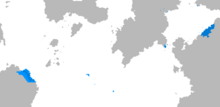Dhimze language
| Dhimze | |
|---|---|
| jhmidzi | |
| Pronunciation | [ˈd͡ʒmid͡zi] |
| Native to | Dhimrai |
| Ethnicity | Dhimze people |
Native speakers | X |
Yasgan
| |
Early forms | Common Dhimze
|
| Dhimze script | |
| Official status | |
Official language in | |
Recognised minority language in | |
 Areas where Dhimze is the majority language Areas where Dhimze is a minority language | |
Dhimze (jhmidzi [ˈd͡ʒmid͡zi]) is a Dhimzic language of the Yasgan family. It descended from Common Dhimze, which was the lingua franca of the ancient Dhimze civilisation. Most of its closest relatives from the Dhimzic family are now long extinct, with the exception of Gharzi, which also descended from Common Dhimze. Throughout its history, Dhimze has been a prestige language in Yazland and other regions, but its use as a scientific and artistic language has faded out since the end of the Copper War.
An attempt to preserve Dhimze has been made in Neo-Dhimze, a revival attempt of Common Dhimze with modernised pronounciation. Neo-Dhimze was primarily for use by the nobility and was later adopted by conservative writers and journalists. In 4550 CY, roughly 19% of the population claimed to have some understanding of Neo-Dhimze, and by 4610 CY only about 4% claim to speak it to some degree.
Dhimze is spoken across the Dhimze colonial empire, which spans several continents from Huo to Ashnan. In Dhimze proper, approximately 83% of the population speaks Dhimze as their first language, and in total 94% claim to be fluent. In New Dhimze, approximately 42% of the population speaks Dhimze as their first language, and in total 51% consider themselves fluent.
History
Common Dhimze
Classical Dhimze
Imperial Dhimze
Modern Dhimze
Geographic distribution
Yazland
Etzavaz
Ashnan
Huo
Varieties
Current status and importance
Phonology
| Labial | Alveolar | Palatal/ Postalveolar |
Velar | Uvular | ||
|---|---|---|---|---|---|---|
| Nasal | m | n | ||||
| Stop | aspirated | pʰ | tʰ | kʰ | qʰ | |
| voiced | b | d | ɡ | |||
| Fricative | voiceless | f | s | ʃ | x | |
| voiced | v | z | ɣ | |||
| Affricate | voiceless | t͡s | t͡ʃ | (q͡χ) | ||
| voiced | d͡z | d͡ʒ | ||||
| Liquid | approximant | l | ||||
| rhotic | r | ʀ̝̊ | ||||
| Front | Back | |
|---|---|---|
| Close | i | u |
| Mid | e | o |
| Open | a | |
Writing system
Morphology
Verbs
Nouns
Dhimze nouns decline according to three grammatical classes (animate, neuter and inanimate) and six cases (nominative, direct, oblique, genitive, locative, vocative).
| deli deli "daughter" (an.) |
jhádzin; jadzin "voice" (n.) |
tovsi tovsi "rake" (inan.) | |
|---|---|---|---|
| Nominative | deli deli |
jhádzin; jadzin |
tovsi tovsi |
| Direct | delin; deli |
jhádzim; jadzim |
n/a |
| Oblique | n/a | jhádzái jadzai |
tovri tovri |
| Genitive | delics; delikhs |
jhádzics; jadzikhs |
tovks; tovks |
| Locative | delc; delkh |
jhádzit; jadzit |
tovki tovki |
| Vocative | deli deli |
jhádzi jadzi |
toviá tovia |
Dhimze uses differential object marking in its nouns depending on their animacy class and definiteness.
- Animate nouns are always marked with the direct case.
- Inanimate nouns are always marked with the oblique case.
- Neuter nouns are marked differently depending on their definiteness:
- Definite neuter nouns are marked with the direct case.
- Indefinite neuter nouns are marked with the oblique case.
Plurals in Dhimze are highly irregular, being inherited directly from Proto-Yasgan's pluralisation system, the pattern of which has since been lost. The various plural endings that can be found are the following:
| Example | |
|---|---|
| -si | qaṙ → qaṙsi |
| -gi | kni → kingi |
| -mi | ghari → gharmi |
| -a | jvzirin → jvzira |
| -ia | tovsi → tovia |
| -ai | ṙeqiin → ṙeqiai |
| -e | teta → tete |
However, some nouns also have consonantal changes due to irregularities, e.g. dzi "language" → dzisha "languages", vdi "fish" (sg.) → vsia "fish" (pl.).
Pronouns
Pronouns in Dhimze are distinguished based on person, number and, in the third person, animacy. Additionally, the reflexive pronouns are formed by adding the suffix -sva "like, as" for the first and second person or the word smtusi "body" for the third person.
| 1st person | 2nd person | 3rd person | ||||
|---|---|---|---|---|---|---|
| SG | PL | SG | PL | SG | PL | |
| Nominative | eqi | dzai | bi | qe | idi (an.) in (n.) dzi (inan.) |
inai |
| Direct | ti | din | jvalin | qen | im (an., n.) dzi (inan.) |
imia |
| Genitive | tmi | jvim | qem | nikhs (an., n.) diks (inan.) |
nikhsia | |
| Reflexive | eqsva | dzaisva | bisva | qesva | idi smtus (an.) in smtus (n.) dzi smtus (inan.) |
inai smtus |